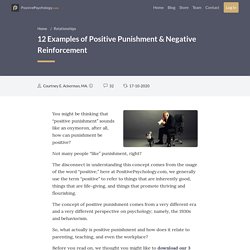

Getting control of your teenagers to not only be prepared for future endeavours and not make rash decisions of the moment can prove to be challenging for every parent but in using correct reinforcement and punishment techniques, you may just be able to wether the storm of adolescence for a brighter future for you teenagers.
Operant Conditioning (B.F. Skinner)
How Reinforcement and Punishment Modify Behavior Operant conditioning, also known as instrumental conditioning, is a method of learning normally attributed to B.F.
Skinner, where the consequences of a response determine the probability of it being repeated. Through operant conditioning behavior which is reinforced (rewarded) will likely be repeated, and behavior which is punished will occur less frequently. 14 Best Examples Of Operant Conditioning. Operant conditioning, also known as instrumental conditioning, is a method of learning that employs punishments and rewards for behavior.

In this method, a link is established between a behavior and a consequence (whether positive or negative) for that behavior. For example, when a monkey presses a button when a LED is on, he receives a banana as a reward. Definition of Operant Conditioning. Positive & Negative Reinforcement and Punishment Explained. Positive and Negative Reinforcement and Punishment. What is Positive / Negative Reinforcement and Punishment. Examples of Positive and Negative Reinforcement and Punishment: Operant Conditioning Explained. 12 Examples of Positive Punishment & Negative Reinforcement. You might be thinking that “positive punishment” sounds like an oxymoron, after all, how can punishment be positive?

Not many people “like” punishment, right? The disconnect in understanding this concept comes from the usage of the word “positive;” here at PositivePsychology.com, we generally use the term “positive” to refer to things that are inherently good, things that are life-giving, and things that promote thriving and flourishing.
The concept of positive punishment comes from a very different era and a very different perspective on psychology; namely, the 1930s and behaviorism. So, what actually is positive punishment and how does it relate to parenting, teaching, and even the workplace? Application of Reinforcement / Punishment for Teenagers.